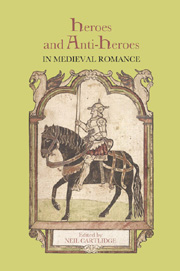Book contents
5 - Mordred
from Part I - Individual Characters
Published online by Cambridge University Press: 05 February 2013
Summary
The Origins of Mordred
Mordred is one of literature's greatest traitors. Moreover, his treachery is compounded by sexual sins that are not its necessary or usual corollaries: adultery and incest. However, the first text in which he appears, the Welsh Annal for the year 537 (which may itself be no older than middle of the tenth century), refers to ‘the battle of Camlann in which Arthur and Mordred fell’ (‘Gueith Camlann in qua Arthur et Medrait corruerunt’) only in a way that seems to be entirely neutral. It is not obvious that he was on the opposite side to Arthur at the sixth-century battle; and the two men may well have fought and died together. References to Mordred in twelfth-century Welsh texts are positive: his valour and good nature form a standard for the praise of others. Arthur and Mordred – although not originally related, as far as we can tell – might thus be said to be warriors ‘on the same side’ and from the same place. In this essay, I propose to discuss how Mordred came to be such an paradigmatically evil figure, to the point where he is used as a template for villainy in other later texts. At the same time, I also want to consider the survival of those admirable aspects in his characterization that ultimately make him a figure of considerable ambivalence: simultaneously both anti-hero and hero.
- Type
- Chapter
- Information
- Heroes and Anti-Heroes in Medieval Romance , pp. 81 - 98Publisher: Boydell & BrewerPrint publication year: 2012



